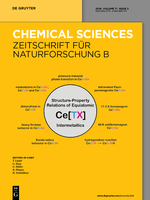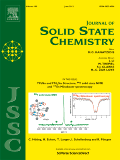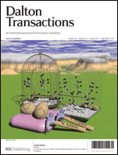
RUSSIAN JOURNAL OF INORGANIC CHEMISTRY
metrics 2024
Exploring the Depths of Inorganic Chemistry
Introduction
The Russian Journal of Inorganic Chemistry is a distinguished publication that delves into the fundamental and applied aspects of inorganic chemistry. Published by MAIK Nauka/Interperiodica/Springer, this journal has established itself as a vital resource for researchers, professionals, and students alike, contributing significantly to the fields of Inorganic Chemistry, Materials Science, and Physical and Theoretical Chemistry. With an ISSN of 0036-0236 and an E-ISSN of 1531-8613, the journal is indexed for easy access and citation. Though the journal currently operates under a subscription model, its commitment to disseminating high-quality research and fostering scientific discourse remains steadfast. The journal has been maintaining a consistent record since its inception, and its positioning in the Q3 quartile across various chemistry categories in 2023 underscores its relevance in the academic community. As it continues through its converged years from 1996 to 2024, the Russian Journal of Inorganic Chemistry plays a pivotal role in enhancing the understanding and advancement of inorganic chemistry, making it an indispensable tool for anyone engaged in this dynamic field.
Metrics 2024
 0.32
0.32 1.80
1.80 1.30
1.30 39
39Metrics History
Rank 2024
Scopus
IF (Web Of Science)
JCI (Web Of Science)
Quartile History
Similar Journals

Inorganic Materials-Applied Research
Unlocking Potential in Inorganic Materials ScienceInorganic Materials-Applied Research is a pivotal journal dedicated to the dissemination of innovative research in the field of inorganic materials. Published by SpringerNature, this journal operates as a vital resource for researchers, professionals, and students alike, providing a platform for cutting-edge findings and methodologies related to the synthesis, characterization, and application of inorganic materials. With an ISSN of 2075-1133 and an E-ISSN of 2075-115X, the journal strives to bridge gaps in interdisciplinary studies, fostering collaboration across the engineering and materials science domains. Despite its current rankings placing it in the Q3 quartile for both Engineering and Materials Science categories, the journal aims for broader impact, seeking to enhance its visibility and contribution in publications through rigorous peer-review and open access options. Converged from 2010 to 2024, it remains committed to advancing knowledge and addressing contemporary challenges in materials science, thereby attracting contributions that are not only academically rigorous but also socially impactful.

CHINESE JOURNAL OF STRUCTURAL CHEMISTRY
Unveiling the Secrets of Structural DynamicsThe CHINESE JOURNAL OF STRUCTURAL CHEMISTRY, published by Elsevier, stands as a vital resource in the field of structural chemistry, notably contributing to the advancement of knowledge since its inception in 1996. With its ISSN 0254-5861 and E-ISSN 0254-5861, the journal has established a firm reputation, garnering a Q2 ranking in the 2023 Chemistry (miscellaneous) category, which highlights its influence in the academic community (rank #155/408, 62nd percentile in Scopus). This journal serves as an invaluable platform for researchers and professionals by disseminating high-quality research findings, theoretical studies, and applied methodologies that address both fundamental aspects and emerging trends in structural chemistry. With contributions from distinguished scholars, it aims to foster innovation and collaboration, while providing a space for novel discoveries in the field. Although it does not currently offer Open Access, its robust content continues to attract a diverse readership eager to engage with cutting-edge scientific developments.

ZEITSCHRIFT FUR NATURFORSCHUNG SECTION B-A JOURNAL OF CHEMICAL SCIENCES
Exploring the Frontiers of Chemical Research Since 1947ZEITSCHRIFT FUR NATURFORSCHUNG SECTION B-A JOURNAL OF CHEMICAL SCIENCES is a distinguished scholarly journal published by Walter de Gruyter GmbH, based in Berlin, Germany. Since its inception in 1947, this journal has served as a vital platform for the dissemination of innovative research and findings in the field of chemical sciences. With an ISSN of 0932-0776 and E-ISSN of 1865-7117, it is indexed in prominent databases, reinforcing its credibility and accessibility for researchers and professionals alike. Currently categorized in the third quartile (Q3) in the field of miscellaneous chemistry according to 2023 assessments, it holds a significant position in the landscape of chemical research, ranking 270th out of 408 in general chemistry with a percentile standing of 33%. Although not an Open Access publication, its rigorous peer-review process ensures the publication of high-quality articles that contribute to advancing knowledge and innovation in chemistry. The journal’s commitment to scientific excellence makes it an essential resource for students and professionals seeking to stay updated with the latest developments in chemical sciences.

Inorganic and Nano-Metal Chemistry
Unveiling Breakthroughs in Nano-Metal Applications.Inorganic and Nano-Metal Chemistry is a premier journal published by Taylor & Francis Inc, focusing on innovative research and advancements in the fields of inorganic chemistry and nano-metal applications. With an increasing impact in the academic community, this journal has established itself within the Q3 category of both Inorganic Chemistry and Physical and Theoretical Chemistry as of 2023, reflecting its global recognition and influence. The journal is accessible as an Open Access publication, ensuring that research findings are freely available to a broad audience, promoting transparency and collaboration in scientific exploration. Based in the United Kingdom, Inorganic and Nano-Metal Chemistry aims to disseminate high-quality peer-reviewed articles that not only highlight fundamental studies but also push the boundaries of technological applications in areas such as catalysis, materials science, and nanotechnology. Researchers, professionals, and students will find this journal an invaluable resource for the latest developments and interdisciplinary insights in the ever-evolving landscape of inorganic and nano-metal chemistry.

Chemistry-Switzerland
Catalyzing Discoveries in Chemistry from Basel to the WorldChemistry-Switzerland is an esteemed, fully Open Access journal published by MDPI, dedicated to advancing research in a broad spectrum of chemistry disciplines. Launched in 2019, the journal has established itself within the academic community, particularly as it spans critical areas such as inorganic and organic chemistry, as well as electrochemistry. Recognized for its contributions, it has achieved notable rankings, including Q2 status in Chemistry (miscellaneous) and Inorganic Chemistry, and Q3 standing in Electrochemistry and Organic Chemistry for 2023. With a commitment to disseminating high-quality research, Chemistry-Switzerland serves as an invaluable resource for researchers, professionals, and students aiming to share their discoveries with a global audience. Located in Basel, Switzerland, this journal facilitates seamless access to cutting-edge research, fostering innovation and collaboration within the vibrant field of chemistry. With this dynamic platform, the journal aims to continue its trajectory of growth and impact, inspiring the next generation of chemists.

JOURNAL OF SOLID STATE CHEMISTRY
Charting New Territories in Materials ChemistryWelcome to the Journal of Solid State Chemistry, a prestigious publication that has been at the forefront of solid state chemistry research since its inception in 1969. Published by Academic Press Inc. Elsevier Science in the United States, this journal offers a rigorous platform for the dissemination of high-impact research articles and reviews in a wide array of categories such as Ceramics and Composites, Condensed Matter Physics, and Materials Chemistry, among others. With an impressive Q2 ranking across multiple categories in 2023 and a commendable performance in Scopus rankings—including a top position in Inorganic Chemistry—this journal serves as an essential resource for researchers, professionals, and students eager to advance their understanding in solid state phenomena. Although it does not currently offer Open Access options, the breadth and quality of the published research ensure significant visibility and scholarly impact. As we continue to converge into 2024, we invite you to explore groundbreaking studies that push the boundaries of knowledge in solid state chemistry.

REVIEWS IN INORGANIC CHEMISTRY
Advancing the Frontiers of Inorganic ChemistryREVIEWS IN INORGANIC CHEMISTRY, published by Walter de Gruyter GmbH, is a distinguished academic journal that serves as a vital resource for researchers, professionals, and students within the field of inorganic chemistry. With its ISSN 0193-4929 and E-ISSN 2191-0227, this journal has made a significant impact on the discipline, holding a commendable Q2 ranking in the 2023 category of Inorganic Chemistry, placing it in the 81st percentile among its peers according to Scopus rankings. Continuously published since its inception, with converged years spanning from 1985 to 1990 and 1992 to 2024, it features comprehensive reviews encompassing the latest advancements, methodologies, and theoretical frameworks in the subject. Researchers will find IDEAL insights and valuable discussions that keep them abreast of trends and challenges in the domain, essential for driving innovation and collaboration. The journal’s commitment to quality and rigorous peer review highlights its importance in advancing inorganic chemistry research, making it an indispensable tool for academic excellence.

CHINESE JOURNAL OF INORGANIC CHEMISTRY
Advancing the Frontiers of Inorganic ChemistryThe CHINESE JOURNAL OF INORGANIC CHEMISTRY, published by the esteemed CHINESE CHEMICAL SOC, stands as a pivotal resource for researchers and professionals in the field of inorganic chemistry. With an ISSN of 1001-4861, this journal has been disseminating cutting-edge research since its establishment in 1996 and continues to influence the scientific community with its commitment to high-quality publications. Although currently classified in the Q4 quartile for Inorganic Chemistry and ranked 70th out of 79 in its category according to Scopus, the journal serves as a platform for innovative studies that push the boundaries of inorganic materials and compounds. While it operates on a traditional access model, the journal is dedicated to fostering scientific discourse and collaboration among scholars in China and beyond, making it an essential reference for anyone involved in inorganic chemistry research.

DALTON TRANSACTIONS
Advancing the Frontiers of Inorganic ChemistryDALTON TRANSACTIONS, published by the esteemed Royal Society of Chemistry, is a premier journal in the field of Inorganic Chemistry, recognized for its significant contributions to advancing research and scholarship since its inception in 2002. With an impressive Impact Factor and ranked in the Q1 category, it holds a notable position at Rank #21 out of 79 within its Scopus category, highlighting its reputation for excellence and influence in the scientific community. This journal provides a platform for disseminating high-quality research, reviews, and communications related to all aspects of inorganic chemistry, fostering collaboration and innovation among researchers, professionals, and students alike. Although it does not offer open access, its robust selection process and commitment to scholarly integrity ensure that published works are of the highest standard. For those passionate about inorganic chemistry, DALTON TRANSACTIONS serves as an essential resource, fostering a deeper understanding of the field and its applications.

Inorganics
Where Groundbreaking Inorganic Discoveries UniteInorganics is a vibrant, peer-reviewed Open Access journal dedicated to advancing the field of inorganic chemistry, published by MDPI since 2013. Based in Switzerland, this journal aims to provide a dynamic platform for researchers, professionals, and students to share groundbreaking findings, fostering collaboration and innovation within the global scientific community. With an impressive Q2 ranking in the category of Inorganic Chemistry as of 2023, Inorganics stands out as a significant conduit for high-quality research that spans a wide range of topics from coordination compounds to metal-organic frameworks. Its commitment to accessibility ensures that cutting-edge research can be accessed, utilized, and built upon by a diverse audience, thereby amplifying its impact. Join the conversation in Inorganics and contribute to the ever-evolving landscape of inorganic chemical research.